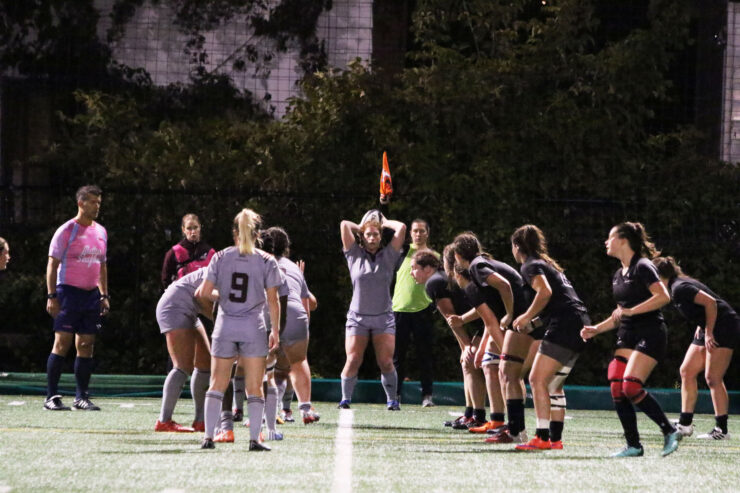Experts recommend 30-60 minutes on the move every day, normalizing and accepting any anxiety or sadness
For many of us who are currently social distancing, it can be hard to stay healthy, both physically and mentally, while isolated at home. Gee-Gees performance coaches shared some advice with the Fulcrum on how to stay mentally and physically fit while social distancing.
Joey Kwasniewski is the Gee-Gees lead varsity performance coach and is responsible for developing Gee-Gees athletes’ workout programs. Kwasniewski recommends implementing a daily workout to stay healthy while self-distancing.
“One of the big things we preach to our Gee-Gee athletes is to keep doing regular perpetual movement, so every day getting off at least 30-60 minutes to move,” said Kwasniewski. “Go outside, go for a walk, go for a run.”
Kwasniewski encourages everyone to stay mobile and do high-movement workouts during their period of social distancing.
“One thing we’ve been teaching is full-body mobilization, it’s something we’ve been posting about on Instagram and teaching for a full year,” said Kwasniewski. “It’s a daily routine where you work out every single part of your body, going head to toe, to discover your range and limitations.”
For members of the U of O community looking to find examples of these workouts, the Gee-Gees performance Instagram account has been posting different full-body workouts every day.
“There’s a lot of things from a kinesthetic and a mobility standpoint that people can be doing to work on their foundations of movements from home, and we’re trying to get that word out,” explained Kwasniewski.
But staying fit physically is only half the battle, and staying fit mentally is just as important. Anna Abraham is the varsity mental health coordinator and counsellor for the Gee-Gees. She offered some tips on how to stay mentally healthy while social distancing in an email to the Fulcrum:
- Normalize and accept any anxiety or sadness. It would be completely natural to feel unpleasant emotions such as growing unease and stress during these uncertain times. We’ll need to be self-compassionate with ourselves if we don’t have the answers to the questions our minds might be proposing. We are being forced to face the fragility of our health and mortality. It’s big stuff! Similarly, we may be coping with grief over lost opportunities and/or experiences.
- Remember the why of social distancing. We’re following these guidelines to stay home and stay apart for the health of ourselves and our community in the hopes of “flattening the curve” for our health care system. These are certainly not futile measures so give yourself credit for joining in solidarity even at the cost of possibly being seen as over-reacting from certain individuals.
- Find routine. Our new normal keeps changing and we’ll have to be flexible and adapt. Although we may have lost control over many aspects of daily life we can certainly establish new controllables at home in for example, how we choose to: structure the day, stay digitally connected, maintain our physical health through proper sleep/physical activity/nutrition, be creative, be present in the relationships with those actually physically next to us, tackle our to-do-lists, relax, learn, prioritize self-care, get fresh air outside, limit the news intake and have fun.
- Access your supports. Being at home for long periods of time won’t be easy for many of us. Speaking about our worries to others can help alleviate anxiety. Connecting digitally with our far-away friends and family will be important to limit social isolation. Sometimes, reaching out to a mental health professional and/or resource may be necessary. Many are ensuring their services remain accessible by phone or video.
- Seek gratitude and purpose. I am unsure what the next chapter will bring for us all but I know there will be one. Until then, finding thankfulness and meaning in today, no matter the scale, can be helpful. In a world that was running at an incredibly fast-pace with barely any time for us to “stop and smell the roses”, here we are. We are given a strange opportunity to pause and grow in the comforts of home. Only time will tell what the, if any positive global effects of this are, but we’re already seeing a reduction in pollution and the creation of procedures that will be advantageous during the next pandemic. On an individual scale, we can decide now what we make of this unprecedented period of history. Was it to start those unread books? Clean those messy closets? Organize those digital files? Spend quality time with our loved ones? Finish those d-i-y projects? Learn that dusty instrument? Being able to invest in and accomplish these previously discarded goals can be quite fulfilling and rewarding. And we’ll need every bit of that joy and satisfaction to get through this.
Read More:
- COVID-19: U of O closes all sports and recreational facilities
- U of O students living in res distressed, frustrated over COVID-19 move out
- ‘A question of social responsibility’: U of O president urges social distancing as COVID-19 spreads





